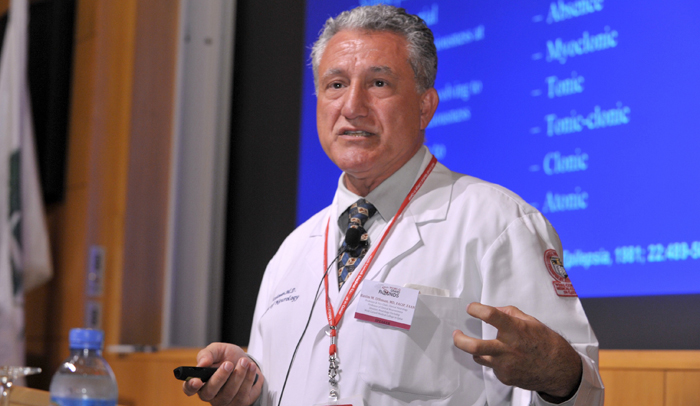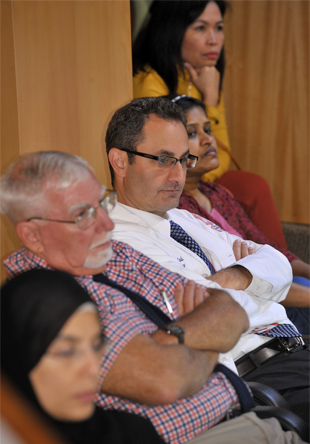Complexities of seizure diagnosis discussed at Grand Rounds
November, 2015

and a practicing neurology consultant at Hamad Medical Corporation.
At the latest installment of WCM-Q’s Grand Rounds a leading neurologist discussed the complexities of accurately diagnosing a patient’s first seizure.
Dr. Basim Uthman, professor of clinical neuroscience at WCM-Q, explained that epilepsy is just one of many causes of seizures, and that there are several different epilepsy syndromes, which makes accurate diagnosis and treatment a complex task requiring clinical expertise in the field.
The Grand Rounds, developed by WCM-Q’s Division of Continuing Professional Development, provides a platform for expert speakers to engage with healthcare professionals in the community to disseminate knowledge of the latest developments in medical technology, research and best practice. The activity is accredited through the joint providership of Weill Cornell Medicine and WCM-Q.
Speaking at WCM-Q to an audience of physicians, researchers, students and healthcare professionals, Dr. Uthman said: “There are many variables that must be considered in order to reach an accurate diagnosis following a first seizure, which is why it is very important to see a neurology specialist if a seizure has occurred. It is important to note that not all seizures are the result of epilepsy and a few other conditions such as sleep disorders and syncope may mimic epilepsy and present with seizure-like symptoms like impaired awareness, loss of consciousness and unusual behaviors and responses.
“For instance, seizures might be caused by something fairly easy to treat, like low blood sugar, very low sodium, severe dehydration or calcium deficiency. Once those conditions are corrected, seizures will not recur. Alternatively, seizures could be caused by one of the several forms of epilepsy syndromes, each of which has subtly different causes and symptoms. We therefore have to take very detailed patient histories, perform a wide range of tests and then analyze the results very carefully to make a diagnosis and determine the best treatment.”

researchers, students and healthcare professionals.
Dr. Uthman is professor & vice chair of clinical neurology at WCM-Q, director of the neurology clerkship at WCM-Q and a practicing neurology consultant at Hamad Medical Corporation.
Dr. Uthman explained that epilepsy could be the result of inborn genetic abnormalities in the brain, metabolic disorders, brain injuries caused by trauma, or brain damage caused by aneurysm, stroke, oxygen deprivation or a brain tumor, among other things.
It is estimated that around one per cent of people worldwide are affected by epilepsy, though the great majority are seizure-free with treatment. One-quarter to one-third continue to have seizures in spite of medications. Seizures do not always involve convulsions but can take the appearance of momentary fixed staring or mild trembling.
Dr. Uthman said: “The wide range of symptoms and etiologies [causes] make diagnosis very complex, but the good news is that modern testing and brain imaging technology is extremely sophisticated, allowing neurology specialists to make very accurate diagnoses. Happily, we can often control epilepsy using medications, and in children there is often a good chance they will simply grow out of the condition as they get older and their brain develops.”
Forms of epilepsy that are caused by inborn errors of metabolism can often be treated by changes in diet or by administering supplements. In cases that do not respond well to medication, surgery may be necessary.
Dr. Stephen Atkin, professor of medicine at WCM-Q, said: “We are very grateful to Dr. Uthman for a very illuminating talk about a fascinating area of medical science. We are very pleased that Grand Rounds has been able to shine a light on this subject for the benefit of our audience of healthcare professionals who joined us at Weill Cornell Medicine-Qatar for this presentation.”

